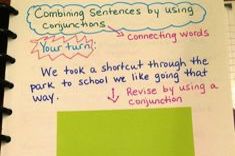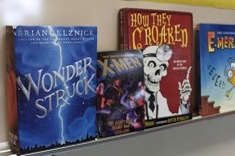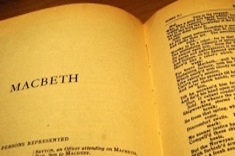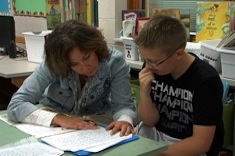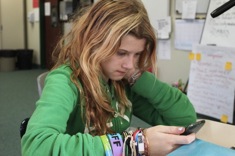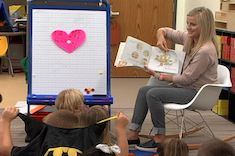9th
Latest Content
Rethinking Grammar Instruction in High School
What conventions can be taught in a way that sticks with older adolescents? Gretchen Schroeder slows down and focuses to improve her instruction.
Close Reading and Multiple Layers in Middle School
Christy Rush-Levine uses striking texts that inspire multiple readings by her middle school students.
Can Books Harm Children? Support and Censorship
Shari Frost asks a provocative question: Can books harm children? She explores practical ways for teachers to walk the fine line between support and censorship in matching books to students.
Giving Audio Feedback to Student Writing
If you find yourself buried in student work that needs a response, you’ll enjoy suggestions from Bill Bass for using a nifty new online tool.
First Shared Text: Fishing for Many Meanings with Adolescents
Christy Rush-Levine introduces her middle school students to the complexity of reading on the first day of school.
The Data Wall Debacle
Shari Frost has a suggestion for what shouldn’t be on classroom walls: student assessment scores. She explains why this practice can be harmful to students.
Creating Video with Students: Tools and Tips
Bill Bass gives advice and provides resources for creating video with high school students.
Sentence Combining in Workshops
Heather Rader has strategies for using sentence combining in literacy workshops.
The Power of Mystery Series for Teens and Tweens
Ruth Shagoury shares her top picks of mystery series for teens and tweens.
A Tool Worth Exploring: Sentence Combining
Heather Rader begins a new series on sentence combining, an alternative to traditional drill and kill grammar instruction.
Explanatory Grammar Moves: Getting Verbal with It
Jeff Anderson concludes his series on explanatory grammar moves by exploring participles, included in the Common Core eighth-grade standard covering the use of verbals.
Act III: Exploring Subtext with A Midsummer Night’s Dream (Shakespeare and the Common Core Series)
Gretchen Schroeder concludes her Shakespeare in the Age of the Common Core Series with activities to explore subtext in A Midsummer Night’s Dream.
Act II: Understanding Hamlet Through Close Reading (Shakespeare and the Common Core Series)
Gretchen Schroeder continues her Shakespeare and the Common Core series on teaching the classics in high school, explaining how she uses Hamlet in creative ways to teach close reading strategies.
Keep Going
Ruth Ayres has advice for moving forward, staying positive, and focusing on what’s important.
Act I: Delving into Deep Questions with Macbeth (Shakespeare and the Common Core Series)
Gretchen Schroeder launches a three-part series on Shakespeare in the Age of the Common Core. This week’s installment is a fresh take on teaching Macbeth to high school students.
Explanatory Grammar Moves: Right-Branching Sentences
Jeff Anderson continues his Explanatory Grammar Series with a feature on the power of right-branching sentences.
Powerful Conferences
Ruth Ayres explains how deciding the purpose of conferring in advance can lead to more powerful conferences.
Your Opinion Matters—Really
Gretchen Schroeder guides us in getting feedback from students, as well as sharing with students the way their feedback matters to us. In a world where we are constantly asked to fill out feedback forms, it’s good to know when our opinions matter.
Using Pinterest for Professional Development
Franki Sibberson finds Pinterest is a useful tool for professional development.
Helping Students Evaluate Online Video for Research
Even if your district is blocking web video now, it's not going anywhere. As time goes on, schools will rely more and more on video available from the Internet for research and learning. Bill Bass has practical advice for helping middle and high school students assess everything from suspect sources to appalling comments on the Wild Wild Web.
“My Ideal Bookshelf”: Books that Educate Us
Ellie Gilbert shares an activity that is a terrific way to get to know your new students. Although Ellie works with high school students, this activity can be adapted for the younger grades.
A Summer Reading Camp for Middle School Students
Katherine Sokolowski has tips for a "book club" summer reading camp for middle school students.
Death in Books: Finding Our Way After Loss
Books can help children deal with the toughest challenges in life. In a new booklist, Andie Cunningham shares her top picks for stories about characters grappling with the death of a loved one.
Understanding the Middle East Through Children’s Literature (BOOKLIST)
Sheiks, harems, and terrorists — the stereotypes of the middle east from popular culture may not be realistic, but they sure are pervasive. Ruth Shagoury and Andie Cunningham find authentic alternative views to present to children in their new booklist.
Vocabulary and iPhones: A Four-Step Process for Independent Student Word Learning
Bryce Bennett develops a four-step process to help high school students use their smartphones to master difficult vocabulary while reading.
My Name Is Not Julie
Ellie Gilbert is deeply moved when her high school student connects to a text in a startling way. It’s one of those magic moments that keeps teachers coming back to classrooms, but is nearly impossible to share with others.
Understanding Adolescent Readers: A Podcast with Penny Kittle
In this podcast, Penny Kittle chats with Franki Sibberson about how to inspire a passion for reading in adolescents. A full transcript is available below the player.
Literacy in Content Areas: A Podcast with Penny Kittle
Penny Kittle talks with Franki Sibberson about how to help students grow as readers and writers throughout the curriculum.
Field Experience: Social-Emotional Learning in Workshop
Compassion and understanding are as important to workshop instruction as strategies and routines. Ruth Ayres compiled a field experience to highlight the way understanding the social-emotional needs of students (and ourselves) allows for safe learning environments.
Field Experience: Picture Books and Older Students
The value of picture books with older students is often questioned. Ruth Ayres assembled this field experience to allow insight into the depth and power of picture books for older students.
Browse Content By
Type
Category
- Assessment Tools
- Big Fresh Archives
- Booklists
- Choice Numeracy
- Classroom Design
- Common Core
- Community Building
- Conferring
- Content Literacy
- Digital Literacy
- English Language Learners
- Equity
- Family Relations
- Free Samples
- Guiding Groups
- Leadership
- Literacy Coaches
- Mentor Texts
- Minilessons
- New Teacher Mentors
- Podcasts
- Poetry
- Quote Collections
- Reading Strategies
- Self Care
- Struggling and Striving Learners
- Talking and Listening
- Teacher Study Groups
- Teaching Reading
- Teaching Writing
- Word Study and Vocabulary
Author
- Melissa Quimby
- Nawal Qarooni
- Gwen Blumberg
- Julie Cox
- The Lead Learners
- Hannah Tills
- Josie Stewart
- Ruth Metcalfe
- Mallory Messenger
- Becca Burk
- Jodie Bailey
- Vivian Chen
- Mary Brower
- Tiffany Abbott Fuller
- Stephanie Affinito
- Ruth Ayres
- Leigh Anne Eck
- Heather Fisher
- Shari Frost
- Julie Johnson
- Suzy Kaback
- Gigi McAllister
- Shirl McPhillips
- Melanie Meehan
- Cathy Mere
- Debbie Miller
- Tara Barnett and Kate Mills
- Tammy Mulligan
- Dana Murphy
- Bitsy Parks
- David Pittman
- Brenda Power
- Heather Rader
- Matt Renwick
- Mandy Robek
- Christy Rush-Levine
- Gretchen Schroeder
- Jen Schwanke
- Brian Sepe
- Katherine Sokolowski
- Stella Villalba
- Jennifer Vincent
Grade Level
Choice Literacy Membership
Articles
Get full access to all Choice Literacy article content
Videos
Get full access to all Choice Literacy video content
Courses
Access Choice Literacy course curriculum and training

